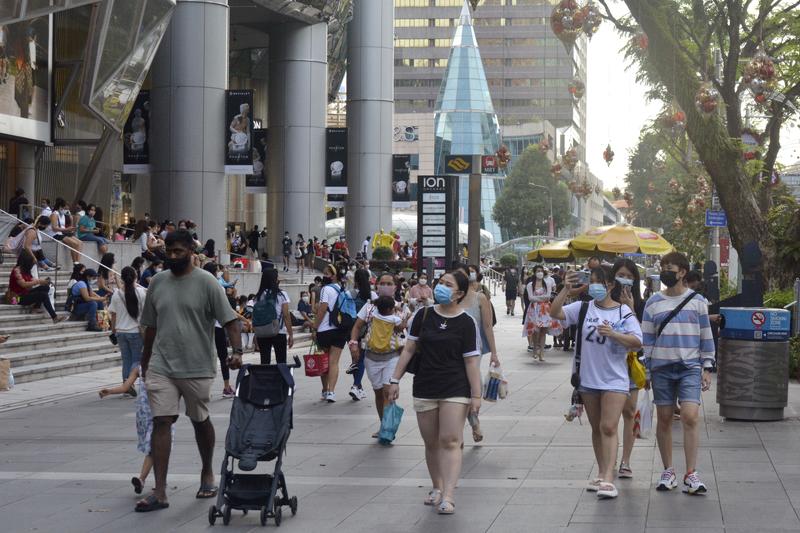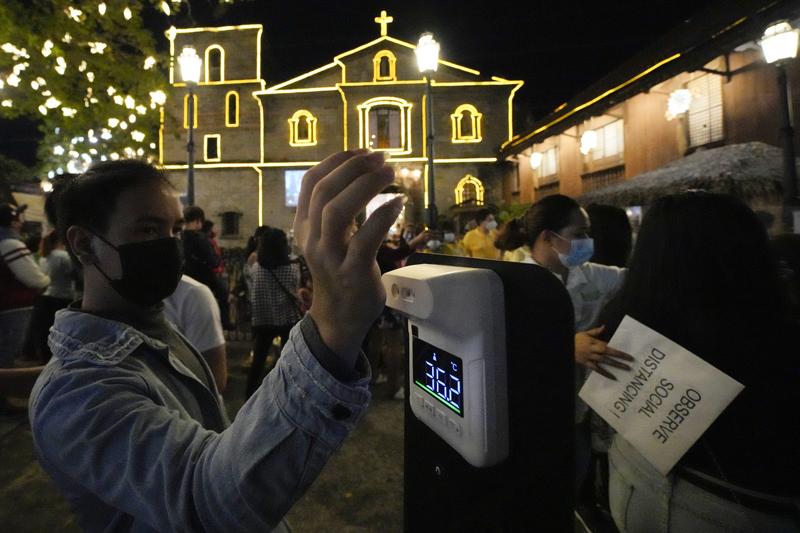 People wearing protective face masks walk along the Orchard Road shopping area in Singapore on Nov 28, 2021. (ANNABELLE LIANG / AP)
People wearing protective face masks walk along the Orchard Road shopping area in Singapore on Nov 28, 2021. (ANNABELLE LIANG / AP)
ANKARA / JERUSALEM / MANILA / NEW DELHI / SEOUL / SINGAPORE / SYDNEY / TOKYO - Singapore will freeze the sale of tickets for arriving flights and buses under its quarantine-free travel program for four weeks from Thursday, the government said, citing the risk from the fast-spreading Omicron COVID-19 variant.
Under the vaccinated travel lane program, Singapore allows quarantine-free entry for fully vaccinated travellers arriving from certain countries on designated flights or buses. The travellers have to undergo regular testing.
About two dozen countries are listed in the program including Australia, India, Malaysia, Britain and the United States.
But no new tickets would be issued for people hoping to arrive from any of those countries from Thursday to Jan 20, the government said on Wednesday.The government said it would also reduce the VTL quotas and ticket sales for travel after Jan 20. For flights, the total number of VTL tickets would be capped at 50 percent of the previously allocated quota.
Travellers already holding tickets on VTL flights or buses and who meet all other requirements can still travel under the program.
The government also urged people arriving in Singapore to minimize their social interactions, avoid large gatherings and eating out for seven days even if their tests, which they have to take every day for the week, are negative.
Australia
Australian Prime Minister Scott Morrison on Wednesday ruled out a Christmas lockdown, saying hospitals were coping well with a record surge in COVID-19 cases fuelled by the Omicron variant.
Australia is grappling with the more transmissible Omicron variant of the coronavirus as restrictions ease ahead of the Christmas holidays after higher vaccination levels were reached.
"Despite these rising cases, hospitals and health systems remain in a strong position but of course they will be tested," Morrison told reporters in Canberra after an emergency Cabinet meeting.
Even as daily infections surge to record tallies, hospitalization and death rates remain low compared with those seen during a wave of cases from the Delta wave and Morrison said there would be no more lockdowns.
Morrison insisted that limiting the spread of the virus comes down to personal responsibility. No national mandatory rule to wear masks indoors would be introduced, although it would be "strongly recommended," he said.
However, residents of most states, except the most populous New South Wales, have been ordered by their state governments to wear masks indoors in public buildings.
After the meeting, Morrison announced new vaccination funding for clinics and pharmacies. He also urged the country's states to reopen hundreds of vaccination hubs, to accelerate a booster rollout, which were shut down when double-dose rates in adults topped 80 percent.
Morrison said vaccination hubs were accelerating the rollout of boosters but any decision to shorten the waiting time for the shots would be taken by vaccination experts.
India
India told state governments on Tuesday to be proactive and on the lookout for surges of the Omicron coronavirus variant after cases nearly doubled within a week across a dozen states.
India, whose already creaking health system became overwhelmed by COVID cases in the summer, has recorded 200 Omicron infections, mostly in the western state of Maharashtra and the nation's capital New Delhi, the health ministry said.
Health Secretary Rajesh Bhushan said states could take containment measures including night curfews and allow fewer people at offices and on public transport should there be a surge.
States were allowed to impose restrictions if the rate of new infections reached 10 percent or higher in a week or 40 percent of oxygen or ICU beds were occupied. But given the increased transmissibility of the Omicron variant, Bhushan told states to impose such measures even if the surge was not that high.
 A medic from Israel's Magen David Adom emergency service prepares a booster shot of the coronavirus vaccine in Tel Aviv, Israel on Aug 14, 2021. (TSAFRIR ABAYOV / AP)
A medic from Israel's Magen David Adom emergency service prepares a booster shot of the coronavirus vaccine in Tel Aviv, Israel on Aug 14, 2021. (TSAFRIR ABAYOV / AP)
Israel
An Israeli hospital on Tuesday confirmed the first known death in the country of a patient with the Omicron variant of COVID-19, but said he had suffered from a number of serious pre-existing conditions. The Soroka Medical Center in Beersheba said the man, in his sixties, died on Monday, two weeks after he was admitted to the coronavirus ward.
A hospital statement said the patient suffered from a variety of serious illnesses. "His morbidity stemmed mainly from pre-existing sicknesses and not from respiratory infection arising from the coronavirus,” it said.
A PCR test led to suspicion that the Omicron variant was present so it was sent for DNA analysis, the statement added.
Israeli media reports from The Times of Israel and Ynet said the patient had received two vaccine doses.
Israel announced on Tuesday that it will offer a fourth dose of the COVID-19 vaccine to people older than 60, amid concern about the spread of the Omicron variant of the coronavirus.
A Israeli Health Ministry expert panel recommended the fourth shot, a decision that was swiftly welcomed by Prime Minister Naftali Bennett as "great news that will help us overcome the Omicron wave that is spreading around the world"
A Health Ministry expert panel recommended the fourth shot, a decision that was swiftly welcomed by Prime Minister Naftali Bennett as "great news that will help us overcome the Omicron wave that is spreading around the world."
Although the decision is pending formal approval by senior health officials, Bennett urged Israelis to get the dose as soon as possible, saying: "My message is - don’t waste time, go get vaccinated." The decision follows the first known death in Israel of a patient with the Omicron variant. An Israeli hospital on Tuesday confirmed the death but said he had suffered from a number of serious pre-existing conditions.
Israel has already this week expanded a travel ban to countries including the United States, Germany, Italy, Turkey and Canada to try to curb the spread of the virus.
Bennett's office said it had also approved reducing office attendance by 50 percent for public sector employees to encourage more remote work.
Japan
Japan has found its first suspected instance of community spread infection from the Omicron variant of coronavirus, the governor of Osaka prefecture said on Wednesday.
Three cases in the prefecture of Osaka were determined to be the Omicron variant but the infection route was not clear and they did not travel abroad, Osaka Governor Hirofumi Yoshimura told a coronavirus policy meeting.
Prime Minister Fumio Kishida on Tuesday said its COVID-19 border controls, some of the strictest in the world, would remain in place for the time being.
 A resident has his temperature checked as a safety measure to curb the spread of the coronavirus during the first of nine daily dawn masses before Christmas day at the St. Joseph Parish Church in suburban Las Pinas city, Philippines, Dec 16, 2021. (AARON FAVILA / AP)
A resident has his temperature checked as a safety measure to curb the spread of the coronavirus during the first of nine daily dawn masses before Christmas day at the St. Joseph Parish Church in suburban Las Pinas city, Philippines, Dec 16, 2021. (AARON FAVILA / AP)
The Philippines
The Philippines' health ministry on Tuesday halved the wait time for a COVID-19 vaccine booster to three months to help prevent the spread of the more infectious Omicron variant.
A growing list of countries, including South Korea, the United Kingdom, Thailand and Germany, are shortening the interval for boosters to try to stave off a new surge in infections.
Adults can receive a booster dose at least three months after the second shot of a two-dose vaccine, cutting the six-month gap. Recipients of a single-dose vaccine can get a booster shot after two months, the health ministry said.
The Southeast Asian nation has detected three imported cases of Omicron variant.
The Philippines has received more than 192 million doses of COVID-19 vaccines, and fully inoculated roughly 44.2 million of its 110 million population, government data show.
South Korea
Last week South Korea authorities announced a series of social distancing measures lasting until at least Jan 2. They include limiting gatherings to no more than four people and forcing restaurants, cafes and bars to close by 9 pm.
The measures came just six weeks after highly-vaccinated South Korea eased many restrictions to try to "live with COVID-19." Since then daily cases and serious infections have hit record highs, adding to strains on the country's medical system.
The government has said it plans to pay 1 million won (839) each to small business owners.
Associations of small business and restaurant owners have issued a series of statements protesting the decision and calling for measures to compensate their losses. One of the associations has vowed to stage a rally this week.
READ MORE: South Korea sees record number of critical COVID-19 cases
Turkey
Turkey on Tuesday reported 19,859 new COVID-19 cases, bringing the total number of infections to 9,209,740, according to its health ministry.
The number of people who have died as a result of the virus has risen by 187 to 80,778 in the country, while 25,532 more recovered in the last 24 hours.
According to the ministry, 353,152 tests were conducted over the past day.


